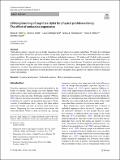| dc.contributor.author | Allen, Kelsey R. | |
| dc.contributor.author | Smith, Kevin A. | |
| dc.contributor.author | Bird, Laura-Ashleigh | |
| dc.contributor.author | Tenenbaum, Joshua B. | |
| dc.contributor.author | Makin, Tamar R. | |
| dc.contributor.author | Cowie, Dorothy | |
| dc.date.accessioned | 2023-12-14T20:22:50Z | |
| dc.date.available | 2023-12-14T20:22:50Z | |
| dc.date.issued | 2023-12-04 | |
| dc.identifier.uri | https://hdl.handle.net/1721.1/153168 | |
| dc.description.abstract | ‘Embodied cognition’ suggests that our bodily experiences broadly shape our cognitive capabilities. We study how embodied experience affects the abstract physical problem-solving styles people use in a virtual task where embodiment does not affect action capabilities. We compare how groups with different embodied experience – 25 children and 35 adults with congenital limb differences versus 45 children and 40 adults born with two hands – perform this task, and find that while there is no difference in overall competence, the groups use different cognitive styles to find solutions. People born with limb differences think more before acting but take fewer attempts to reach solutions. Conversely, development affects the particular actions children use, as well as their persistence with their current strategy. Our findings suggest that while development alters action choices and persistence, differences in embodied experience drive changes in the acquisition of cognitive styles for balancing acting with thinking. | en_US |
| dc.publisher | Springer US | en_US |
| dc.relation.isversionof | https://doi.org/10.3758/s13423-023-02400-4 | en_US |
| dc.rights | Creative Commons Attribution | en_US |
| dc.rights.uri | https://creativecommons.org/licenses/by/4.0/ | en_US |
| dc.source | Springer US | en_US |
| dc.title | Lifelong learning of cognitive styles for physical problem-solving: The effect of embodied experience | en_US |
| dc.type | Article | en_US |
| dc.identifier.citation | Allen, Kelsey R., Smith, Kevin A., Bird, Laura-Ashleigh, Tenenbaum, Joshua B., Makin, Tamar R. et al. 2023. "Lifelong learning of cognitive styles for physical problem-solving: The effect of embodied experience." | |
| dc.contributor.department | Massachusetts Institute of Technology. Department of Brain and Cognitive Sciences | |
| dc.contributor.department | Center for Brains, Minds, and Machines | |
| dc.identifier.mitlicense | PUBLISHER_CC | |
| dc.eprint.version | Final published version | en_US |
| dc.type.uri | http://purl.org/eprint/type/JournalArticle | en_US |
| eprint.status | http://purl.org/eprint/status/PeerReviewed | en_US |
| dc.date.updated | 2023-12-10T04:07:43Z | |
| dc.language.rfc3066 | en | |
| dc.rights.holder | The Author(s) | |
| dspace.embargo.terms | N | |
| dspace.date.submission | 2023-12-10T04:07:43Z | |
| mit.license | PUBLISHER_CC | |
| mit.metadata.status | Authority Work and Publication Information Needed | en_US |
